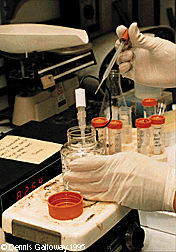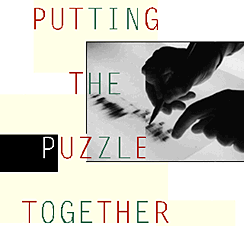

The UW had sought her for more than a year and a half before King gave the thumbs up, sending the moving vans north and the champagne corks popping at the UW.
"We were very excited at the opportunity to recruit Mary-Claire," says Paul Ramsey, chairman of the Department of Medicine. "We're pleased with the interactive nature of her position, with her joint appointment in the College of Arts and Sciences, where she teaches undergraduates, as well as her primary appointment in medical genetics."
In the view of both Leroy Hood and Maynard Olson, enticing King to the UW can be attributed in part to the $12 million donated in 1991 by Microsoft CEO Bill Gates to launch the Department of Molecular Biotechnology.
"The seed money from Bill Gates has helped attract a number of people here," says Hood.
"If seed money is used effectively, the programs can pay for themselves with external grant money," says Olson. "But there's no way to get into the game without the seed money. It's a genuine success story."
"I've known Mary-Claire since the beginning of her career," says Arno Motulsky, UW professor of medicine and genetics. "She has a combination of scientific persistence and intuition, and she finally got to the gene. She unites expertise in epidemiology, molecular biology and genetics, focused on a single disease."

While cloning the gene may lead to a cure for this family's deafness (thus far they seem to be unique in the world), Lynch says that, just as importantly, understanding the genetic mechanism involved in their hearing loss will help scientists determine which genes are involved in normal hearing.
The King lab also does work on the genetics of HIV and rheumatoid arthritis, but she will continue to concentrate her efforts on BRCA1, and its ties to breast, ovarian and possibly prostate cancer.
"She understands that human genetics is about people," continues Olson. "Many scientists don't see intuitively the huge jump we take when we move from the genetics of flies to the genetics of people, but there's a need for a strong human dimension to human genetics. It could be argued that it's the most exciting thing happening in science, because it's about us. It touches incredibly personal parts of our lives. We're fortunate to have human geneticists like Mary-Claire King who have the ability to meet people where they are and understand the human dimension of their scientific pursuits." END
A former newspaper reporter, Laurie McHale is media relations coordinator for the UW Health Sciences Center. She has a B.A. in English from the University of British Columbia.
The Woman as Scientist
Mary-Claire
King's Home Page
Send a letter to the editor at columns@u.washington.edu.